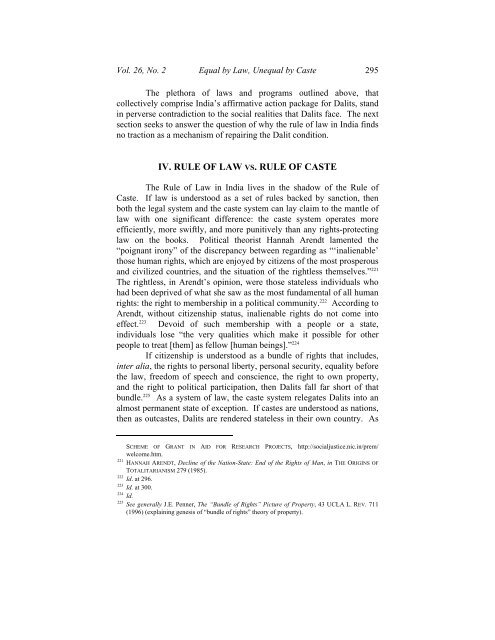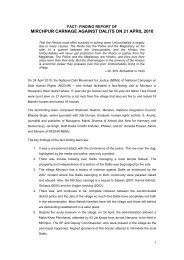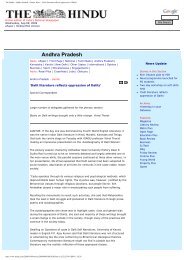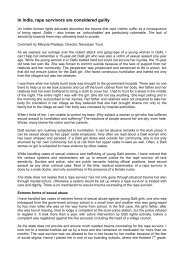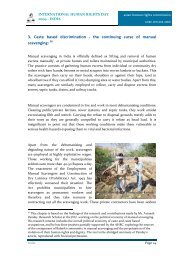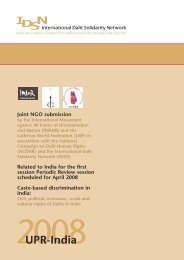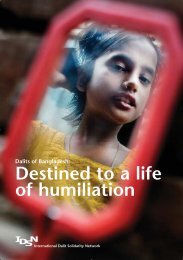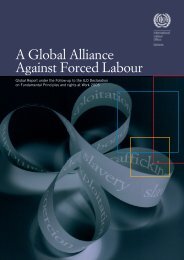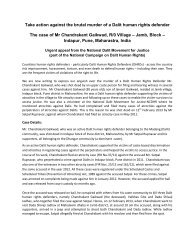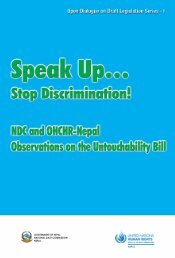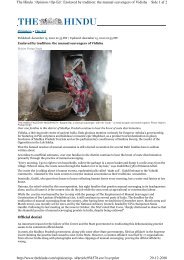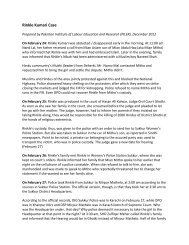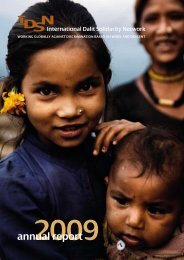294 Wisconsin <strong>International</strong> Law Journalfor self-employment activities and through development programsdesigned to increase education and skills. Included among these arepost-matriculation scholarships for scheduled <strong>caste</strong> students (whichpurportedly reach over 20 million students), special educationdevelopment programs for scheduled <strong>caste</strong> girls with low literacy levels,hostels for scheduled <strong>caste</strong> girls and boys from rural or remote areas(designed to facilitate access to education), and a centrally-sponsoredassistance scheme for scheduled <strong>caste</strong> development corporations, whichprovide eligible scheduled <strong>caste</strong> families with low-interest loans andfinancial assistance for a variety of economic development schemes. 215Pursuant to Articles 38, 216 39, 217 and 46 of the constitution aSpecial Component Plan (“SCP”) was introduced in 1979 with a view to“achieving overall development of SCs/STs (ScheduledCastes/Scheduled Tribes) and to raise them above the poverty line.” 218The SCP is “an umbrella programme under which all schemesimplemented <strong>by</strong> State and Central Governments are dovetailed foraddressing different needs of the Scheduled Castes,” and is used <strong>by</strong> theCentral Government to direct funds to critical areas of need to ensure thedevelopments needs of the scheduled <strong>caste</strong> population. 219 The Ministryof Social Justice and Empowerment’s Planning, Research, Evaluation,and Monitoring Division (“PREM”) is charged with assessing theeffectiveness of these welfare programs. Through PREM, the Ministryprovides grants to research institutions, professional organizations, anduniversities to study its scheduled <strong>caste</strong> welfare programs. 220215 Ministry of Social Justice and Empowerment, Government of India, SCHEDULED-CASTEWELFARE PROGRAMS, http://socialjustice.nic.in/schedule/welcome.htm (last visited Aug. 15,2008).216 Under Article 38,[The] State[,] to secure a social order for the promotion of welfare of the people . . .shall strive to promote the welfare of the people <strong>by</strong> securing and protecting aseffectively as it may a social order in which justice, social, economic and political,shall inform all the institutions of the national life . . . [and] shall, in particular, striveto minimise the in<strong>equal</strong>ities in income, and endeavour to eliminate in<strong>equal</strong>ities instatus, facilities and opportunities, not only amongst individuals but also amongstgroups of people residing in different areas or engaged in different vocations.INDIA CONST. art. 38.217 Article 39 mandates that the State shall direct its policies to conform to principles of economicand social <strong>equal</strong>ity. INDIA CONST. art. 39.218 See FACT SHEET, MINISTRY OF SOCIAL JUSTICE AND EMPOWERMENT, http://pib.nic.in/archieve/factsheet/fs2000/socialjustice.html (last visited Aug. 15, 2008).219 Id.220 PLANNING, RESEARCH, EVALUATION & MONITORING DIV., MINISTRY OF SOC. JUSTICE &EMPOWERMENT, GOV’T OF INDIA, RESEARCH/EVALUATION STUDIES SPONSORED UNDER THE
Vol. 26, No. 2 Equal <strong>by</strong> Law, Un<strong>equal</strong> <strong>by</strong> Caste 295The plethora of <strong>law</strong>s and programs outlined above, thatcollectively comprise India’s affirmative action package for <strong>Dalit</strong>s, standin perverse contradiction to the social realities that <strong>Dalit</strong>s face. The nextsection seeks to answer the question of why the rule of <strong>law</strong> in India findsno traction as a mechanism of repairing the <strong>Dalit</strong> condition.IV. RULE OF LAW VS. RULE OF CASTEThe Rule of Law in India lives in the shadow of the Rule ofCaste. If <strong>law</strong> is understood as a set of rules backed <strong>by</strong> sanction, thenboth the legal system and the <strong>caste</strong> system can lay claim to the mantle of<strong>law</strong> with one significant difference: the <strong>caste</strong> system operates moreefficiently, more swiftly, and more punitively than any rights-protecting<strong>law</strong> on the books. Political theorist Hannah Arendt lamented the“poignant irony” of the discrepancy between regarding as “‘inalienable’those human rights, which are enjoyed <strong>by</strong> citizens of the most prosperousand civilized countries, and the situation of the rightless themselves.” 221The rightless, in Arendt’s opinion, were those stateless individuals whohad been deprived of what she saw as the most fundamental of all humanrights: the right to membership in a political community. 222 According toArendt, without citizenship status, inalienable rights do not come intoeffect. 223 Devoid of such membership with a people or a state,individuals lose “the very qualities which make it possible for otherpeople to treat [them] as fellow [human beings].” 224If citizenship is understood as a bundle of rights that includes,inter alia, the rights to personal liberty, personal security, <strong>equal</strong>ity beforethe <strong>law</strong>, freedom of speech and conscience, the right to own property,and the right to political participation, then <strong>Dalit</strong>s fall far short of thatbundle. 225 As a system of <strong>law</strong>, the <strong>caste</strong> system relegates <strong>Dalit</strong>s into analmost permanent state of exception. If <strong>caste</strong>s are understood as nations,then as out<strong>caste</strong>s, <strong>Dalit</strong>s are rendered stateless in their own country. AsSCHEME OF GRANT IN AID FOR RESEARCH PROJECTS, http://socialjustice.nic.in/prem/welcome.htm.221 HANNAH ARENDT, Decline of the Nation-State: End of the Rights of Man, in THE ORIGINS OFTOTALITARIANISM 279 (1985).222 Id. at 296.223 Id. at 300.224 Id.225 See generally J.E. Penner, The “Bundle of Rights” Picture of Property, 43 UCLA L. REV. 711(1996) (explaining genesis of “bundle of rights” theory of property).
- Page 1 and 2: EQUAL BY LAW, UNEQUAL BY CASTE: THE
- Page 3 and 4: Vol. 26, No. 2 Equal by Law, Unequa
- Page 5 and 6: Vol. 26, No. 2 Equal by Law, Unequa
- Page 7 and 8: Vol. 26, No. 2 Equal by Law, Unequa
- Page 9 and 10: Vol. 26, No. 2 Equal by Law, Unequa
- Page 11 and 12: Vol. 26, No. 2 Equal by Law, Unequa
- Page 13 and 14: Vol. 26, No. 2 Equal by Law, Unequa
- Page 15 and 16: Vol. 26, No. 2 Equal by Law, Unequa
- Page 17 and 18: Vol. 26, No. 2 Equal by Law, Unequa
- Page 19 and 20: Vol. 26, No. 2 Equal by Law, Unequa
- Page 21 and 22: Vol. 26, No. 2 Equal by Law, Unequa
- Page 23 and 24: Vol. 26, No. 2 Equal by Law, Unequa
- Page 25 and 26: Vol. 26, No. 2 Equal by Law, Unequa
- Page 27 and 28: Vol. 26, No. 2 Equal by Law, Unequa
- Page 29 and 30: Vol. 26, No. 2 Equal by Law, Unequa
- Page 31 and 32: Vol. 26, No. 2 Equal by Law, Unequa
- Page 33 and 34: Vol. 26, No. 2 Equal by Law, Unequa
- Page 35 and 36: Vol. 26, No. 2 Equal by Law, Unequa
- Page 37 and 38: Vol. 26, No. 2 Equal by Law, Unequa
- Page 39: Vol. 26, No. 2 Equal by Law, Unequa
- Page 43 and 44: Vol. 26, No. 2 Equal by Law, Unequa
- Page 45 and 46: Vol. 26, No. 2 Equal by Law, Unequa
- Page 47 and 48: Vol. 26, No. 2 Equal by Law, Unequa
- Page 49 and 50: Vol. 26, No. 2 Equal by Law, Unequa
- Page 51 and 52: Vol. 26, No. 2 Equal by Law, Unequa
- Page 53 and 54: Vol. 26, No. 2 Equal by Law, Unequa
- Page 55: Vol. 26, No. 2 Equal by Law, Unequa
- Page 58 and 59: 312 Wisconsin International Law Jou
- Page 60 and 61: 314 Wisconsin International Law Jou
- Page 62 and 63: 316 Wisconsin International Law Jou
- Page 64 and 65: 318 Wisconsin International Law Jou
- Page 66 and 67: 320 Wisconsin International Law Jou
- Page 68 and 69: 322 Wisconsin International Law Jou
- Page 70 and 71: 324 Wisconsin International Law Jou
- Page 72 and 73: 326 Wisconsin International Law Jou
- Page 74 and 75: 328 Wisconsin International Law Jou
- Page 76 and 77: 330 Wisconsin International Law Jou
- Page 78 and 79: 332 Wisconsin International Law Jou
- Page 80 and 81: 334 Wisconsin International Law Jou
- Page 82 and 83: 336 Wisconsin International Law Jou
- Page 84 and 85: 338 Wisconsin International Law Jou
- Page 86 and 87: 340 Wisconsin International Law Jou
- Page 88 and 89: 342 Wisconsin International Law Jou


